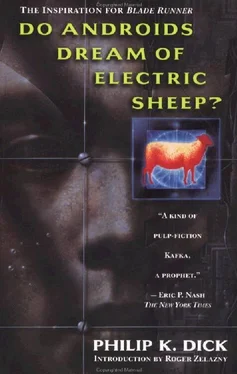It, he thought. She keeps calling the owl it . Not her. “Just a second,” he said.
Pausing at the door, Rachael said, “You’ve decided?”
“I want,” he said, opening his briefcase, “to ask you one more question from the Voigt-Kampff scale. Sit down again.”
Rachael glanced at her uncle; he nodded and she grudgingly returned, seating herself as before. “What’s this for?” she demanded, her eyebrows lifted in distaste—and wariness. He perceived her skeletal tension, noted it professionally.
Presently he had the pencil of light trained on her right eye and the adhesive patch again in contact with her check. Rachael stared into the light rigidly, the expression of extreme distaste still manifest.
“My briefcase,” Rick said as he rummaged for the Voigt-Kampff forms. “Nice, isn’t it? Department issue.”
“Well, well,” Rachael said remotely.
“Babyhide,” Rick said. He stroked the black leather surface of the briefcase. “One hundred percent genuine human babyhide.” He saw the two dial indicators gyrate frantically. But only after a pause. The reaction had come, but too late. He knew the reaction period down to a fraction of a second, the correct reaction period; there should have been none. “Thanks, Miss Rosen,” he said, and gathered together the equipment again; he had concluded his retesting. “That’s all.”
“You’re leaving?” Rachael asked.
“Yes,” he said. “I’m satisfied.”
Cautiously, Rachael said, “What about the other nine subjects?”
“The scale has been adequate in your case,” he answered. “I can extrapolate from that; it’s clearly still effective.” To Eldon Rosen, who slumped morosely by the door of the room, he said, “Does she know?” Sometimes they didn’t; false memories had been tried various times, generally in the mistaken idea that through them reactions to testing would be altered.
Eldon Rosen said, “No. We programmed her completely.
But I think toward the end she suspected.” To the girl he said, “You guessed when he asked for one more try.”
Pale, Rachael nodded fixedly.
“Don’t be afraid of him,” Eldon Rosen told her. “You’re not an escaped android on Earth illegally; you’re the property of the Rosen Association, used as a sales device for prospective emigrants.” He walked to the girl, put his hand comfortingly on her shoulder; at the touch the girl flinched.
“He’s right,” Rick said. “I’m not going to retire you, Miss Rosen. Good day.” He started toward the door, then halted briefly. To the two of them he said, “is the owl genuine?”
Rachael glanced swiftly at the elder Rosen.
“He’s leaving anyhow,” Eldon Rosen said. “It doesn’t matter; the owl is artificial. There are no owls.”
“Hmm,” Rick muttered, and stepped numbly out into the corridor. The two of them watched him go. Neither said anything. Nothing remained to say. So that’s how the largest manufacturer of androids operates, Rick said to himself. Devious, and in a manner he had never encountered before. A weird and convoluted new personality type; no wonder law enforcement agencies were having trouble with the Nexus-6.
The Nexus-6. He had now come up against it. Rachael, he realized; she must be a Nexus-6 . I’m seeing one of them for the first time. And they damn near did it; they came awfully damn close to undermining the Voigt-Kampff scale, the only method we have for detecting them. The Rosen Association does a good job—makes a good try, anyhow—at protecting its products.
And I have to face six more of them, he reflected. Before I’m finished.
He would earn the bounty money. Every cent.
Assuming he made it through alive.
The TV set boomed; descending the great empty apartment building’s dust-stricken stairs to the level below, John Isidore made out now the familiar voice of Buster Friendly, burbling happily to his system-wide vast audience.
“—ho ho, folks! Zip click zip! Time for a brief note on tomorrow’s weather; first the Eastern seaboard of the U.S.A. Mongoose satellite reports that fallout will be especially pronounced toward noon and then will taper off. So all you dear folks who’ll be venturing out ought to wait until afternoon, eh? And speaking of waiting, it’s now only ten hours ‘til that big piece of news, my special exposé! Tell your friends to watch! I’m revealing something that’ll amaze you. Now, you might guess that it’s just the usual—”
As Isidore knocked on the apartment door the television died immediately into nonbeing. It had not merely become silent; it had stopped existing, scared into its grave by his knock.
He sensed, behind the closed door, the presence of life, beyond that of the TV. His straining faculties manufactured or else picked up a haunted, tongueless fear, by someone retreating from him, someone blown back to the farthest wall of the apartment in an attempt to evade him.
“Hey,” he called. “I live upstairs. I heard your TV. Let’s meet; okay?” He waited, listening. No sound and no motion; his words had not pried the person loose. “I brought you a cube of margarine,” he said, standing close to the door in an effort to speak through its thickness. “My name’s J. R. Isidore and I work for the well-known animal vet Mr. Hannibal Sloat; you’ve heard of him. I’m reputable; I have a job. I drive Mr. Sloat’s truck.”
The door, meagerly, opened and he saw within the apartment a fragmented and misaligned shrinking figure, a girl who cringed and slunk away and yet held onto the door, as if for physical support. Fear made her seem ill; it distorted her body lines, made her appear as if someone had broken her and then, with malice, patched her together badly. Her eyes, enormous, glazed over fixedly as she attempted to smile.
He said, with sudden understanding, “You thought no one lived in this building. You thought it was abandoned.”
Nodding, the girl whispered, “Yes.”
“But,” Isidore said, “it’s good to have neighbors. Heck, until you came along I didn’t have any.” And that was no fun, god knew.
“You’re the only one?” the girl asked. “In this building besides me?” She seemed less timid, now; her body straightened and with her hand she smoothed her dark hair. Now he saw that she had a nice figure, although small, and nice eyes markedly established by long black lashes. Caught by surprise, the girl wore pajama bottoms and nothing more. And as he looked past her he perceived a room in disorder. Suitcases lay here and there, opened, their contents half spilled onto the littered floor. But this was natural; she had barely arrived.
“I’m the only one besides you,” Isidore said. “And I won’t bother you.” He felt glum; his offering, possessing the quality of an authentic old pre-war ritual, had not been accepted. In fact the girl did even seem aware of it. Or maybe she did not understand what a cube of margarine was for. He had that intuition; the girl seemed more bewildered than anything else. Out of her depth and helplessly floating in now-receding circles of fear. “Good old Buster,” he said, trying to reduce her rigid postural stance. “You like him? I watch him every morning and then again at night when I get home; I watch him while I’m eating dinner and then his late late show until I go to bed. At least until my TV set broke.”
“Who—” the girl began and then broke off; she bit her lip as if savagely angry. Evidently at herself.
“Buster Friendly,” he explained. It seemed odd to him that this girl had never heard of Earth’s most knee-slapping TV comic. “Where did you come here from? “ he asked curiously.
“I don’t see that it matters.” She shot a swift glance upward at him. Something that she saw seemed to ease her concern; her body noticeably relaxed. “I’ll be glad to receive company,” she said, “later on when I’m more moved in. Right now, of course, it’s out of the question.”
Читать дальше








